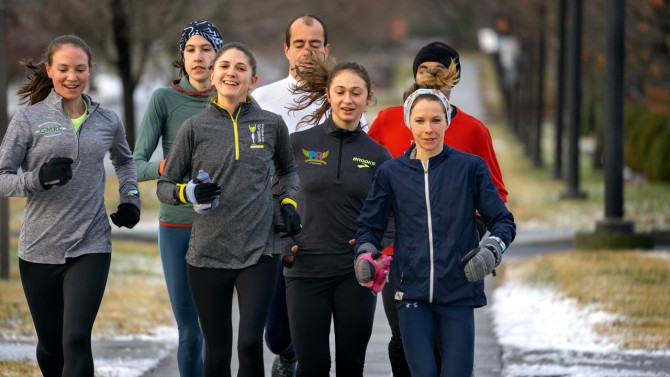Chelsea Benson, who works at the Cornell Lab of Ornithology, and Bailey Drewes, a clinical research coordinator in the Division of Nutritional Sciences, have qualified for the Olympic Marathon trials to be held in Atlanta on Feb. 29.
For runners heading to Olympic trials, it’s been a long haul
By Melanie Lefkowitz
Chelsea Benson often wakes up at 5 a.m. for her first run of the day. She gets home in time to put her 5-year-old twins on the school bus at 7:20. Then she heads to her full-time job as a public program coordinator at the Cornell Lab of Ornithology.
After work, she does either another run, cross-training or weight training. On Sundays she takes a longer run – 20 miles or more.
“It’s not easy to cram 20 hours a week of training in with a 40-hours-a-week job and having two kids,” said Benson, who will compete in the U.S. Olympic Team Trials for the marathon, Feb. 29 in Atlanta, Georgia. “It’s a way to get out of the house and have my own interest, and show my kids you can have a goal and go after it. I want to show them you can do anything you put your mind to.”
For Benson, long-distance running was a way to meet people when she moved to Ithaca – a passion she could pursue after having twins. For her running partner, Bailey Drewes, a clinical research coordinator in the Division of Nutritional Sciences, competitive running offered not just exercise but camaraderie.
Both women ran during middle school, high school and college, but didn’t feel they found their niche – or their community – until they started running marathons.
“I never ever would have imagined that I’d qualify for the Olympic trials,” Drewes said. “I didn’t feel like I reached my full potential in high school or college – I think I’ve always been a long-distance person. Running the marathon, I finally found where my heart was.”
Since qualifying for the trials – which, for women, requires running the 26.2-mile event in 2 hours, 45 minutes or faster – their goal has shifted to reaching the more elite “A” standard, requiring a 2:37 time. Their passion for marathon running reflects a nationwide trend: 511 women qualified for the 2020 Olympic marathon trials, compared with 198 in 2016.
The number of men qualifying increased more modestly, from 211 in 2016 to 260 this year.
Benson, Drewes and Julianne Quinn, Ph.D. ’17, work with the same California-based running coach, though Quinn now lives in Charlottesville, Virginia, where she’s an associate professor of engineering at the University of Virginia.
They’re inspired by professional runners. But they love the spirit among sub-elite runners like themselves, who juggle jobs in addition to their training, rarely draw high-profile sponsorships, and generally pay their own way when they travel to compete.
“Now I have friends in New York and Texas and California, and I only see them at races but it’s a really nice community,” Benson said. “We’re competitive, but in a healthy way. Everybody’s super encouraging. Nobody is trying to cut anybody down.”
They’re also active members of the local running community. Benson is among the organizers of a local Facebook group, Ithaca Runners, open to anyone in the area who is interested in running.
Running long distances can be meditative but it’s also social, Drewes and Benson said. Training together and keeping in touch on Instagram and Strava, a fitness-based social network, helps them look forward to their races.
The marathon’s demands are challenging, they said, but its rewards compensate.
“What I love about the marathon is those first 15 to 20 miles, before it really starts to hurt – when you’re alongside these women who are all pushing hard for the same goal,” Drewes said. “You’re not super tired yet. You’re also not super competitive yet, and it feels like we’re all alongside each other, encouraging each other, laughing together.”
They credit their running success to finding a race they were passionate about, the discipline of professional coaching, the support they’ve found in each other – and not taking any of it too seriously.
“We have high goals for ourselves, but we also keep it light and in perspective,” Drewes said. “Ultimately, we all just do it for fun.”
Media Contact
Get Cornell news delivered right to your inbox.
Subscribe
